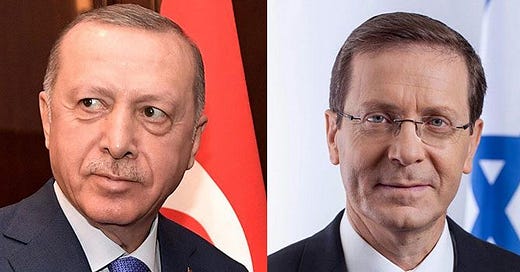The Herzog-Erdoğan Summit: Why now?
Plus: Understanding a no-fly zone. Ukraine bleeds. Global Eyes.
Today in the magazine, Gabi Mitchell considers last week’s summit between Israeli President Isaac Herzog and Turkish President Recep Tayyip Erdoğan. Why, he asks, is this happening now?
It’s a good question.
After enduring twelve years of a dysfunctional relation with Ankara, Israel has managed to piece together a network of relationships with other countries who don’t fully replace Turkey, but who support its regional interests. They include Greece, Cyprus, UAE, Bahrain, and Egypt. The common thread is that they aren’t Erdoğan’s biggest fans, either. So what’s the incentive to support Erdoğan’s reelection campaign at this vulnerable moment, and how will that happen without upsetting Israel’s new partners? Should Israel seize the opportunity to reset diplomatic relations no matter who’s the head of state? What other incentives might be pushing Israel to consider normalization? …
“The elephant in the room,” he answers, “is the Russian invasion of Ukraine.”
Read the article here.
Some companion reading:
This exchange at the Atlantic Council in Turkey about the state of Israel-Turkey relations and Herzog’s visit. Gabi participated in the exchange, as did Brenda Shaffer, a nonresident senior fellow at the Atlantic Council, and Karel Valansi, a political columnist for T24 and Şalom in Turkey.
Gabi also offered his views in this report on the summit: Israel, Turkey repairing ties could limit Russian influence.
Financial Times reporter Laura Pitel wrote an excellent piece on the Turkish economy and Erdoğan’s efforts to stave off recession.
Soli Özel contributed this piece about the role of populism in Turkish politics—and the prospect of the end of the Erdoğan era—for the Institute Montaigne.
There’s barely a country in the world that will be unaffected by the war in Europe. Many relationships will change as a consequence. In the past two weeks, everyone has been tripping over each other to cite Lenin’s aphorism: “There are decades where nothing happens; and there are weeks where decades happen.” They’re citing it because it’s true.
Understanding a no-fly zone
Tecumseh Court says, “These links would be useful for understanding what a no-fly zone is and what implementing one would actually take.”
Why a no-fly zone over Ukraine could make the war far more deadly:
Establishing a no-fly zone has two problems, explains Mark Cancian, a retired Marine Corps colonel and senior adviser with the Center for Strategic and International Studies in Washington, D.C. “The first is the need to enforce it, which requires shooting down Russian aircraft and attacking their ground-based air defenses. That risks starting a broader war,” he tells Popular Mechanics. “The second problem is that it would not help very much. Most of the explosions happening in cities come from missiles and artillery, not from aircraft, so a no-fly zone would not stop them.”
Russia is not a weak country that will back down in the face of a no-fly zone. Furthermore, it has options to escalate the conflict, from launching tactical ballistic missiles and cruise missiles at NATO targets across Europe, to launching cross-border ground attacks into NATO countries bordering Ukraine and Europe. …
More advice from the Cosmopolitan Globalists
Do what JFK did. By David Patrikarakos: Here’s how we can end nightmare—by taking a leaf out of JFK’s book: US President’s dealings with Nikita Khrushchev before the 1962 missile crisis could show us the way out of Ukraine crisis.
Do what Truman did. By Robert Zubrin. What would Harry Truman do? Truman was not willing to go to nuclear war to save South Korea, but he was not willing to allow it to be defeated either. So he found a third alternative: limited war.
Don’t do what George W. Bush, Obama, and Trump did. By Nicolas Tenzer.
George W. Bush, after his administration apparently pledged his support for the legal government of Georgia, has only ever verbally condemned the 2008 aggression against Tbilisi. This did not prevent Barack Obama from launching his reset in March 2009. The same Barack Obama refused to enforce the red lines he had defined in Syria, thus letting Assad and Iran, and then Putin from 2015, massacre hundreds of thousands of Syrian civilians. He also made it clear to Putin that he had a free hand—and less than a year later Putin attacked Ukraine. The master of the Kremlin was not mistaken: the reactions of the West were, as he had foreseen, inconsistent and poor. Then, with impunity, Putin’s Russia was to spread terror and death in Syria from 2015 onwards—and this continues today. Russia also aids the bloody regime of Maduro, uses its militias in Africa and, together with China, supports the Burmese junta in its policy of all-out repression. …
Don’t do what Biden is doing—Claire.
Keep reading with a 7-day free trial
Subscribe to The Cosmopolitan Globalist to keep reading this post and get 7 days of free access to the full post archives.





